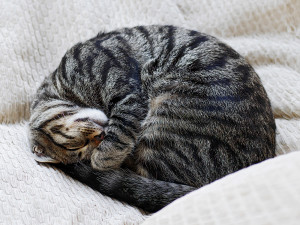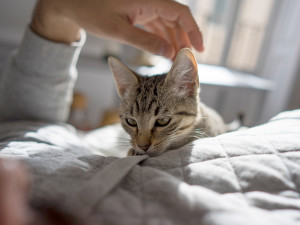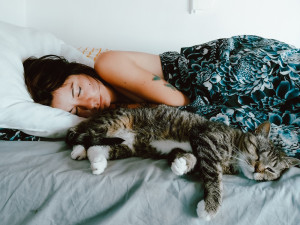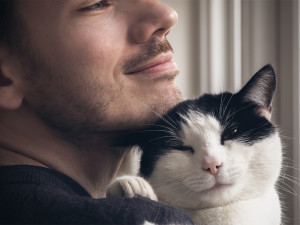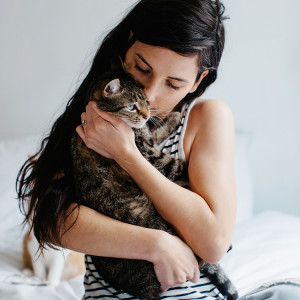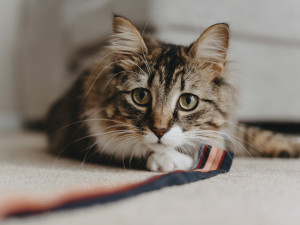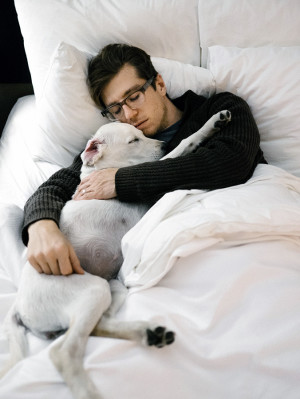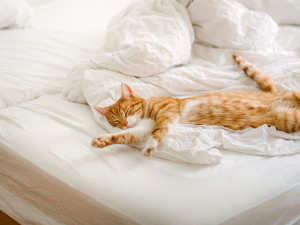Can Cats Have Nightmares?
If so, they’re probably about going to the vet in that stupid carrier.
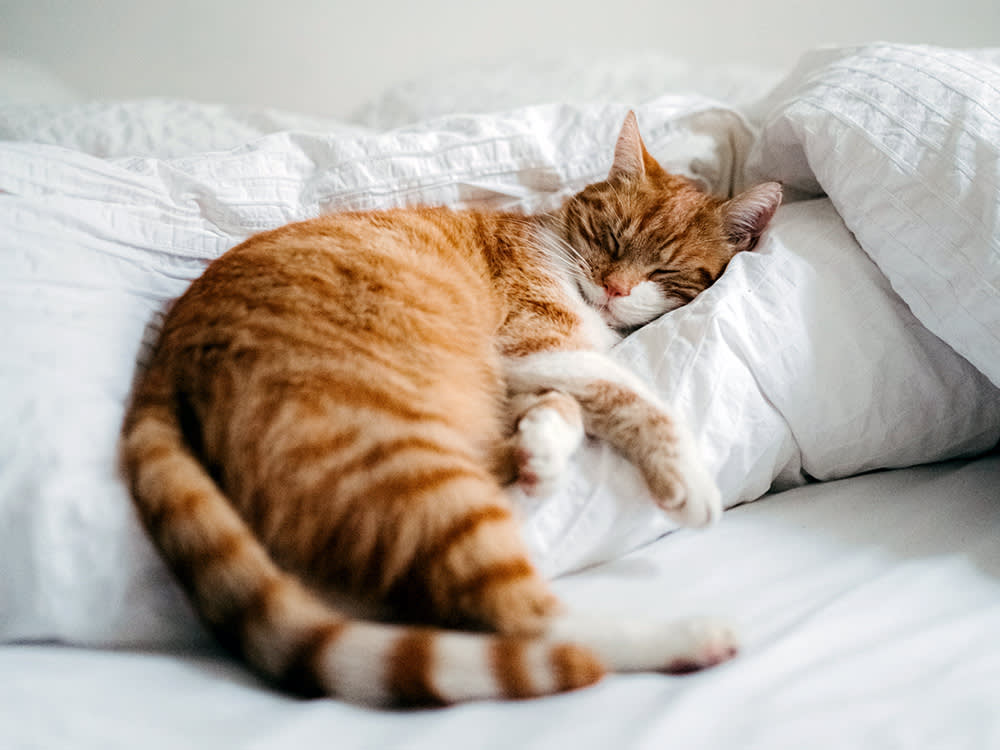
Share Article
In this article:
Do Cats Dream? Can Cats Have Nightmares? Research on Cats Dreaming Signs Your Cat Is Dreaming What Do Cats Dream About?
What cat parent hasn’t watched their kitty snoozing and wondered what’s going on in their sweet little head? As a mom to three cats, I’ve spent many hours gazing at their sleeping faces and trying to resist disturbing them with a snuggle, or a kiss between their funny gremlin-like ears. But occasionally, my cats will twitch in their sleep in a way that makes me worry they’re having a bad dream.
What do cats have nightmares about, anyway? Is it possible they’re dreaming about the time I went on vacation and their automatic litter box got stuck in the wrong position for a whole day before the cat sitter discovered it? Or the time (OK, many times) I slept late on a weekend and they didn’t get breakfast at the usual time? On a more serious note, my cats were all adopted from my local animal shelter, and I don’t know what kind of trauma they may have endured before I welcomed them home.
While there isn't definitive scientific evidence to confirm whether cats experience nightmares in the same way humans do, behavioral observations suggest that cats may indeed have disturbing dreams. Cats, like humans, go through different sleep cycles, including rapid eye movement (REM) sleep, which is associated with dreaming. During REM sleep, cats may exhibit twitching, paw movements, or vocalizations that could suggest they are dreaming.
I asked Dr. Preston Turanoopens in new tab, a veterinarian, all my (and your) questions about cats having nightmares.

Do cats have dreams?
The first question is: Do cats dream at all? Or are we simply eager to believe that our feline friends are just like us? “Cats experience the same sleep cycles as humans, which are rapid eye movement (REM) and non-rapid eye movement (NREM) sleep,” Turano says. “We know that dreams occur during REM sleep. Because they have similar sleep cycles, it would make sense that cats also dream like humans.”
Can cats have nightmares?
So, cats do dream. But do cats have nightmares? “It is impossible to know exactly what cats dream about, or if they have nightmares, as they can’t tell us,” Dr. Turano says. (Personally, I haven’t given up on my own dream of my cats suddenly learning to speak English and hold up their end of the conversation.)
When pressed, Turano offered the following: “Most suspect dreams would be about some sort of life experience or memory. Therefore, the dreams could be pleasant or unpleasant, based on the memory or experience.” I take that to mean yes, cats can have nightmares. But is there research to back that up?
The research on cat dreaming
A study in the October 2021 issue of the scientific journal Consciousness and Cognitionopens in new tab looked at whether animals dream and, perhaps predictably, did not come up with a hard-and-fast answer. “Human dream science is heavily reliant on verbal reports of dream experiences,” the authors write. They go on to question “whether dreaming in non-human animals is inaccessible to science because animals cannot provide verbal reports of dream experiencing.”
In other words, because cats cannot verbally tell us whether they dream, and what they dream about if so, there’s no way to know for sure what’s going on in those adorable heads while they slumber. What do cats dream about when they twitch? Maybe they’re dreaming about chasing a bird, or that time you brushed the mats out of their fur and they hated it — apparently, we’ll never know for sure (at least until my aforementioned dream of my cats learning to speak comes true).
The study authors also quite astutely point out that dreaming in humans isn’t so easy to analyze, either. “Even in humans, the study of dreaming and consciousness during sleep poses both empirical and metaphysical questions,” they write. Come to think of it, I don’t always dream — or at least, I don’t always remember my dreams. And when I do, I’m sometimes unsure whether they were dreams or nightmares. So, it stands to reason that studying whether cats can dream and have nightmares is a tricky business.
Cat sleep cycles
An easier question to answer is regarding cat sleep cycles. Turano told me that cats experience the same sleep cycles as humans, but what are those, exactly? The Sleep Foundationopens in new tab explains that cats experience both rapid-eye movement sleep (REM) and non-rapid-eye movement sleep (NREM). When your cat first falls asleep, they’re in NREM sleep, a period during which they are only lightly sleeping and easily awakened. As they transition into REM sleep, their eyes are moving underneath their eyelids. This is when they may twitch, and also when they go limp — so it’s easy to scoop them up for cuddles. This is also when they may be dreaming.
REM sleep cycles typically last about two to 10 minutes, and NREM cycles last about 12 to 15 minutes. Your cat can cycle through these phases several times during the night (or the day — since every cat parent knows that cats sleep as much in the daytime as they do at night, and maybe more).
Signs your cat is dreaming
How do you know if your kitty is having a dream, either good or bad? What do cats dream about, anyway? Dr. Turano couldn’t speak to the content of cat dreams, but listed the following behaviors as possible indicators that cats are dreaming:
Squeaking
Vocalizing
Eyes, ears, feet, or tail twitching
He says if you notice these signs and are concerned about them, you can take a video to share with your veterinarian, who can hopefully shed some light on what may be going on.
Signs your cat is having a nightmare
Again, it’s impossible to say what cats dream about, and therefore whether your cat might be having a nightmare. If they are vocalizing in a manner that indicates distress, you can always scoop them up and give them some love. A cat who is dreaming is in REM sleep, meaning they are relaxed and more likely to be snuggly. This can even be a nice bonding moment, especially if your cat is usually reluctant to be held.
What do cats dream about?
What do cats have nightmares about? I couldn’t find any research on the subject, and the veterinarians I spoke to declined to hazard a guess. However, as a cat parent of three, I am more than willing to conjecture. My top guesses: vacuum cleaners, apartment buzzers, plumbers and electricians doing noisy work in their home, and their humans going on vacation (because they love us and don’t want us to leave them alone).
FAQs (People also ask):
Why is my cat twitching in their sleep?
It’s quite common for cats to twitch in their sleep. It happens during REM sleep, and some of the reasons for this include dreams (possibly!), allergies, muscle spasms, and in rare cases, seizures.
A cat having a seizure may lose control of their bladder or bowels and their limbs may go rigid, so it looks quite different from normal cat twitching (which again, is completely normal). If you’re concerned, you can pet them or give them a gentle shake to wake them up. If they behave normally, there’s no need for concern. If, however, you suspect a seizure, contact your veterinarian immediately.
What do cats dream about when they twitch?
It’s tempting to think that twitching legs indicate dreams of chasing a mouse, or a twitching tail means they’re dreaming of stalking a squirrel. In the end, we just don’t know what could be happening inside a cat’s brain. And even if they could speak, who can say whether they’d remember their dreams?
Why do cats sleep so much?
Whether or not cats dream and have nightmares, one thing is certain: They sleep a lot. Why? It’s just how they’re made, experts say. Natural hunters, cats are often either tearing around the house or passed out in a pool of sun. It’s normal for cats to spend up to 50 percent of the day sleeping, and this is usually done in short intervals (hence the term “cat nap”). Even though your house cat is not hunting for their food, this hunting — and resting — instinct is still hard-wired.
Remember that you know your cat better than anyone else. If you’re worried about how much your cat is sleeping, or any other behavior that seems off, contact your vet. Take a video of any strange behavior because you know you can’t count on your cat displaying said strange behavior at the vet’s office.
References:
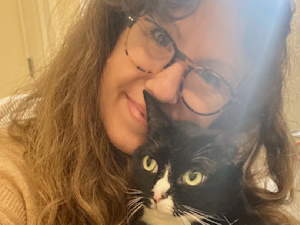
Elizabeth Laura Nelson
Elizabeth Laura Nelson is a writer and editor based in Brooklyn, New York, whose work has appeared in The New York Times, Jenny, Best Life, YourTango, Elite Daily, and more. She focuses her work on relationships, health and wellness, midlife, and lifestyle. As a child, Elizabeth was scared of cats (claws and teeth, yikes) but she has since gotten over her fear and now shares her home with three sweet and gentle feline companions who make life better (and cuddlier) every day.
Related articles
![cat snuggling man]()
What’s Your Cat’s Love Language?
Five surprising ways cats show affection (and how you can show it back), according to a cat behaviorist.
![dark-haired woman hugging cat that has imprinted on her]()
10 Signs Your Cat Has Imprinted on You
Feeling like you have a little shadow these days? Here’s why that’s happening.
![A cute cat laying on the ground with wide eyes]()
Why Do Cats Slow Blink?
Here’s what your cat’s favorite move means.
![Man in his mid 20's cuddling in bed with his white labrador puppy.]()
Why Napping With Your Pet Is Actually Good for You
This study says you benefit from a power nap. Guess what? So does your cat or dog.
![a red cat stretching on a bed]()
Why Is My Cat Twitching in Their Sleep?
Sure, it’s curious—but is it also concerning?

